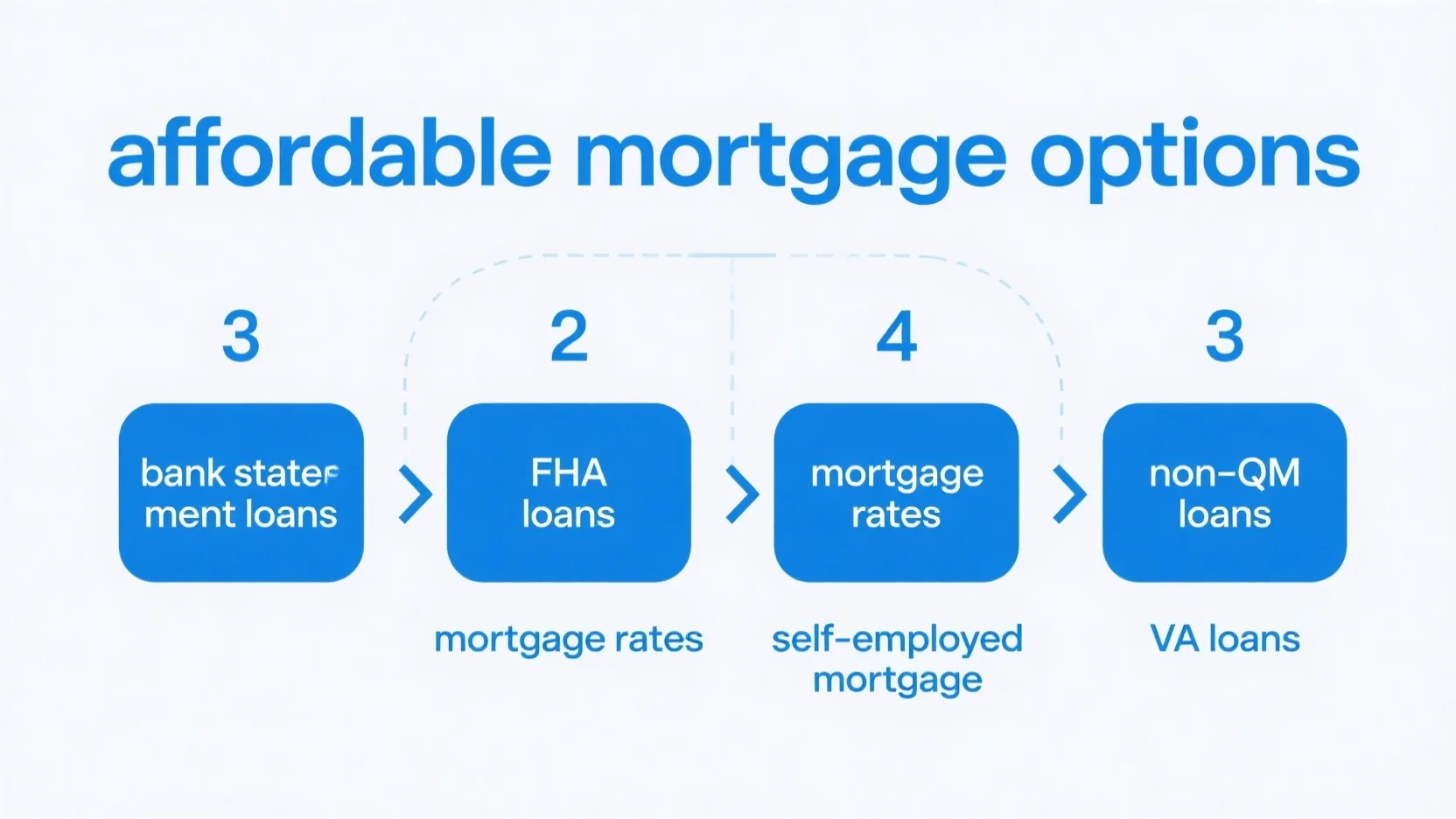
Affordable Mortgage Options for Self-Employed Homeowners

Image Source: pexels
Finding a cheap mortgage when self-employed can be hard. Many lenders reject 73% of self-employed individuals with credit scores under 700, which is higher than the 45% rejection rate for regular workers. I found that being ready and doing research helps a lot. Special options like FHA loans or portfolio loans can help you buy a home, even with tricky finances. Looking into the best mortgage lenders for self-employed individuals can lead to flexible plans that work for you.
Key Takeaways
- People who are self-employed have special problems getting mortgages. They often need to prove income more and get rejected more. Knowing this can help you get ready.
- Keeping your money records organized and raising your credit score is very important. This can help you get approved for a mortgage. Keep your papers tidy and check your money often.
- Look into special mortgage choices like bank statement loans or FHA loans. These loans are made for self-employed people. They can give you more options and make owning a home easier.
Challenges for Self-Employed People Getting Mortgages
Proving Income and Financial Stability
Showing income when self-employed can be really tough. Regular workers give W-2s or pay stubs, but I need more. Lenders ask for tax returns, profit and loss reports, and bank statements. They often want records from the last two years. This can feel stressful if your papers aren’t well-organized.
Having income that changes makes it even harder. Some months we earn a lot, other months less. Lenders check these ups and downs closely, which makes proving stability tricky. Taking tax deductions helps during tax time but lowers taxable income. This can hurt your chances of getting a mortgage. Managing these things is very important.
Tougher Rules for Self-Employed Borrowers
When I looked into mortgages, I saw stricter rules for us. Lenders want a lower debt-to-income ratio, which is hard with big business costs. They also want steady income for years, which isn’t always possible.
Finding lenders who understand self-employed people helps a lot. These lenders may have easier rules for us to follow.
Fewer Traditional Loan Options
Regular loans are made for salaried workers, not self-employed ones. These loans need steady income and few money changes, which doesn’t match our reality.
Luckily, there are other choices. Loans like bank statement loans or non-QM loans are made for self-employed people. Checking out these options and working with helpful lenders can make owning a home possible.
How to Compare the Best Mortgage Lenders for Self-Employed Individuals
Looking at Interest Rates and Loan Terms
When I compared lenders, I focused on interest rates. Even a small rate change can save lots of money over time. I checked offers from lenders who work with bank statement loans. Improving my credit score and lowering my debt helped me get better rates.
I thought about making a bigger down payment too. This lowered the lender’s risk and got me lower rates. Another helpful tip was paying points upfront. This reduced my monthly payments and saved money later.
Finding Flexible Lenders and Special Programs
Lenders who understand self-employed people made a big difference. Some, like CrossCountry Mortgage and Griffin Funding, offer Bank Statement and Profit & Loss Loans. Others, like Defy Mortgage and Guaranteed Rate, focus on non-QM loans for people like me.
LoanDepot and A&D Mortgage had many options, like DSCR Loans. Freedom Mortgage made things easier with programs for self-employed borrowers. These lenders had plans that fit my financial needs.
Reading Reviews and Checking Reputation
I always read reviews before big decisions. Reviews showed how lenders treat their clients. Good feedback about clear communication made me feel better. I also checked their reputation. Lenders with awards or good recognition stood out.
By using reviews and research, I picked the best lenders. This helped me find someone who cared about my needs and gave great service.
Required Documentation for Self-Employed Mortgage Applications
When I applied for a mortgage as self-employed, I saw how important paperwork is. Lenders need to understand my money situation. Collecting the right documents made things easier and gave me confidence.
Tax Returns and Profit/Loss Statements
Tax returns are the most important part of a self-employed mortgage application. Lenders usually ask for two years of personal and business tax returns. These papers show how steady my income is over time. I included all forms, like Schedule C and Schedule E, to give a full picture of my earnings.
Profit and loss statements were also very helpful. They showed how my business was doing financially. This helped lenders see what I could afford. I learned that keeping accurate records really matters.
💡 Tip: Don’t take too many tax deductions before applying for a mortgage. It can lower your taxable income and hurt your chances.
Bank Statements and Business Financial Records
Bank statements were another big requirement. Lenders wanted 12 months of personal and business bank statements. These showed my savings and cash flow. I also gave balance sheets and proof of extra income to make my application stronger.
Keeping my financial papers neat saved me a lot of stress. I made sure everything was updated and easy to read.
Additional Requirements for Contractors and Freelancers
As a freelancer, I had to give more documents. Lenders asked for invoices, client contracts, and letters proving my self-employment. I also shared my business license and membership papers from professional groups.
These extra documents showed I was serious about my work. They also proved I could handle a mortgage.
📌 Note: If you’re a contractor or freelancer, ask your CPA for a letter. It can make your application stronger.
By getting these papers ready, I felt more prepared for my mortgage journey. It showed lenders I was organized and ready to own a home.
Tips to Improve Your Chances of Mortgage Approval
Keep Your Financial Records Neat and Ready
Organizing my financial records helped a lot with my mortgage. I made sure all my documents were ready when needed. This saved time and made things less stressful.
I used apps to track my income and expenses. These tools also kept my tax papers in order. Talking to my CPA helped me understand what lenders wanted. Being prepared made the process easier and gave me confidence.
💡 Tip: Start organizing your papers early. It shows lenders you’re ready for a mortgage.
Work on Your Credit Score and Lower Debt
Improving my credit score was very important. I checked it often and paid bills on time. Reducing my debt made my finances look better to lenders.
Here’s what I did:
- Paid off small debts first to save money.
- Fixed mistakes on my credit report to avoid problems.
- Didn’t take on new debt while applying for a mortgage.
These steps really helped me get closer to approval.
Save More for a Bigger Down Payment
I worked hard to save for a 20% down payment. This helped me avoid extra insurance costs and lowered my monthly payments. Lenders like bigger down payments from self-employed people, so I focused on saving.
I cut back on spending and saved part of my income each month. Watching my savings grow kept me motivated to stick to my plan.
Get Help from a Broker Who Knows Self-Employed Borrowers
A mortgage broker who understood self-employed people made a big difference. My broker gave me advice and helped organize my documents. They found loans that worked for my situation.
The broker explained everything clearly and even got me better loan terms. I recommend finding a broker who knows self-employed mortgages well.
📌 Note: A good broker can make the process easier and find the best loans for you.
Affordable Mortgage Options and Programs for Self-Employed Individuals
Non-QM (Non-Qualified Mortgage) Loans
Non-QM loans are very flexible for self-employed people. They don’t need regular income proof, which made things easier.
- I used bank statements instead of tax returns to show income.
- The rules were less strict than regular loans.
- I qualified even without meeting normal mortgage standards.
Non-QM loans let you use other ways to prove income. You don’t need tax returns or W-2s, which helps self-employed people.
These loans gave me hope and made buying a home possible.
Bank Statement Loans for Self-Employed Borrowers
Bank statement loans were another great choice for me. They used my bank statements instead of tax returns to check income.
- These loans counted all my income, like freelance and rental money.
- The rates and loan amounts were similar to regular loans.
- I liked the faster approval since fewer papers were needed.
This option let me take tax deductions without hurting my mortgage chances. It worked well for my non-traditional income.
FHA and VA Loans Tailored for Self-Employed Applicants
FHA and VA loans were also good options. For FHA loans, I gave two years of tax returns. But exceptions applied if my personal returns showed growing income or I didn’t use business funds for the down payment.
VA loans had different rules. I needed two years of self-employment or one year with related work history.
- FHA loans needed a smaller down payment, making them easier to get.
- VA loans didn’t need a down payment, and credit score rules were fair.
These programs felt designed to help self-employed people like me buy homes.
State and Local Assistance Programs
State and local programs offered grants, low-interest loans, and down payment help. These programs varied by location but supported self-employed buyers.
Some programs helped first-time buyers, making homes more affordable. I suggest checking with your state housing office for these options. They can lower upfront costs and monthly payments.
These programs showed me that help is out there. They gave me confidence to keep going with my home-buying plans.
Getting a mortgage when self-employed can be tricky. Income changes and lots of paperwork make it harder. I fixed this by keeping my financial papers neat. I also worked on raising my credit score. Finding a lender who understood my situation really helped. Staying prepared and not giving up let me buy my home.
FAQ
What credit score is needed for a self-employed mortgage?
Most lenders want a credit score of 620 or more. Raising your score before applying can get you better deals.
Can I get a mortgage if my income changes?
Yes, you can! Lenders look at your two-year average income. Keeping clear records and trying loans like bank statement loans can help.
Do self-employed borrowers need a bigger down payment?
Not always, but it can help. A larger down payment lowers lender risk and makes your application stronger. FHA loans may still allow smaller down payments.
